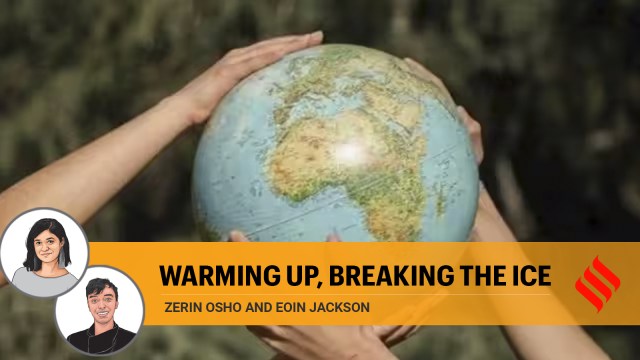
In an emerging multipolar world, India has surprised many observers by extracting a rare thing as host of the G20 Summit — consensus. Seen increasingly as a deterrent against Chinese expansionism, India has shown it can balance the competing interests of the Global North and the Global South. This is essential to protecting our global climate, including critically important ecosystems such as the Arctic.
The Arctic is warming at a rate four times faster than the global average, leading to an unprecedented loss of sea ice, as well as the thawing of permafrost. Continued Arctic change risks losing the North Pole’s “great white shield” and unleashing vast quantities of stored carbon, rivaling the cumulative emissions from the US at its current rate. This can trigger multiple catastrophic and irreversible climate tipping points. Protection of the Arctic is, therefore, crucial to protect the world from the worst effects of the climate emergency.
Despite awareness about the importance of the Arctic, the climatic challenge is being exacerbated by rapid development and growing geopolitical tensions. Russia stretches over 53 per cent of the Arctic Ocean coastline and is pouring resources into commercialising and expanding trade channels along the Northern Sea Route, while continuing to use and transport high-polluting heavy fuel oil through Arctic waters. Russian investments signal its interest in short-term commercial exploitation, not long-term climate preservation. Other Arctic countries are also planning oil and gas development endeavours, despite a growing number of banks committing to abstain from financing such projects.
As developmental pressures increase, the only current governance mechanism for this critical global commons has been suspended. The Arctic Council is a group of eight countries (the US, Russia, Norway, Finland, Sweden, Canada, Denmark, and Iceland) with primary capacity for protecting or exploiting the vital ecosystem. The suspension of the Council due to the Russian invasion of Ukraine has made it more difficult to hold countries accountable and to monitor wider activity contributing to changes in the Arctic.
The Council does not have any member from the Global South, though some, including India, have observer status. The active involvement of India as a member of the Arctic Council to voice the concerns of the Global South could help push for an end to further exploitation.
India’s ability to traverse historical divides and develop aligned positions among the Global North and Global South, as evidenced at the G20 Summit, holds the potential to forge a united approach to safeguarding crucial global ecosystems, especially the Arctic. The New Delhi Leader’s Declaration demonstrated India’s ability to navigate the conflicting interests of the Global North and the Global South. India has a further opportunity to exercise this bridge-building capacity at its proposed virtual G20 Summit in November, where it can raise the Arctic as part of a constructive conversation on climate governance.
This capacity to generate unanimity will be needed to reform Arctic governance and protect the climate. As India takes greater steps towards leading the Global South, its post-G20 future should involve pushing for these reforms and ensuring that climate protection is at the forefront of global Arctic policymaking.
Osho is director India Programme, Institute for Governance & Sustainable Development (IGSD), and Jackson is a Legal Fellow at IGSD